REMEMBERING DR. M. SINGARAVELOO
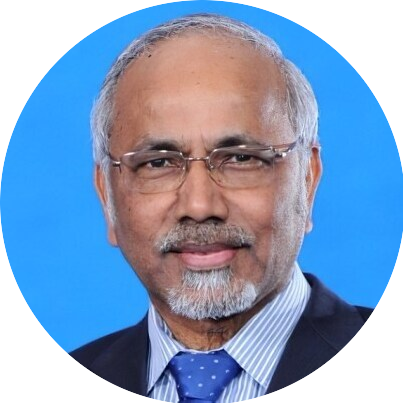
25 December 1947 – 27 January 2024
Dato’ Dr. M. Singaraveloo, popularly known as Dato’ Veloo shall forever be remembered as one who had added lustre to the Faith and decorated the pages of Bahá’í history. Veloo as he preferred to be addressed, laboured for the Cause relentlessly and with such a sincerity throughout his life. He rose from humble beginnings and ascended to remarkable heights in life, as one who was very highly respected in all the circles he moved. History will portray him as a compassionate physician who has made the medical profession proud. He had tirelessly extended a helping hand to the downtrodden and the destitute through numerous humanitarian endeavours and had single-handedly promoted the Cause among many in the elite echelons of society. His was a path less travelled, registering unparalleled when viewed in light of living memory.
Born in Serkam Rubber Plantation Estate in the state of Malacca in 1947, Veloo and his family members soon moved to nearby Jasin town. He was introduced to the Bahá’í Faith by his eldest brother Mr. Palaniandy, a teacher by profession. He and his younger brother Kanesan accepted the Faith at a fireside held at the residence of the late Inbum and Lily Chinniah in Jasin in the last week of December 1964. Veloo loved the Bahá’í Faith immensely and studied it and over time emerged as a well-read and knowledgeable believer. Right from the beginning Veloo was clear-eyed on his chosen path. Laden with a soul overflowing with love for Baháʼu’lláh and vibrating with the newly found Faith, he exerted all his energy and kept a straight course throughout his life to serve the Cause with full sincerity and complete devotion.
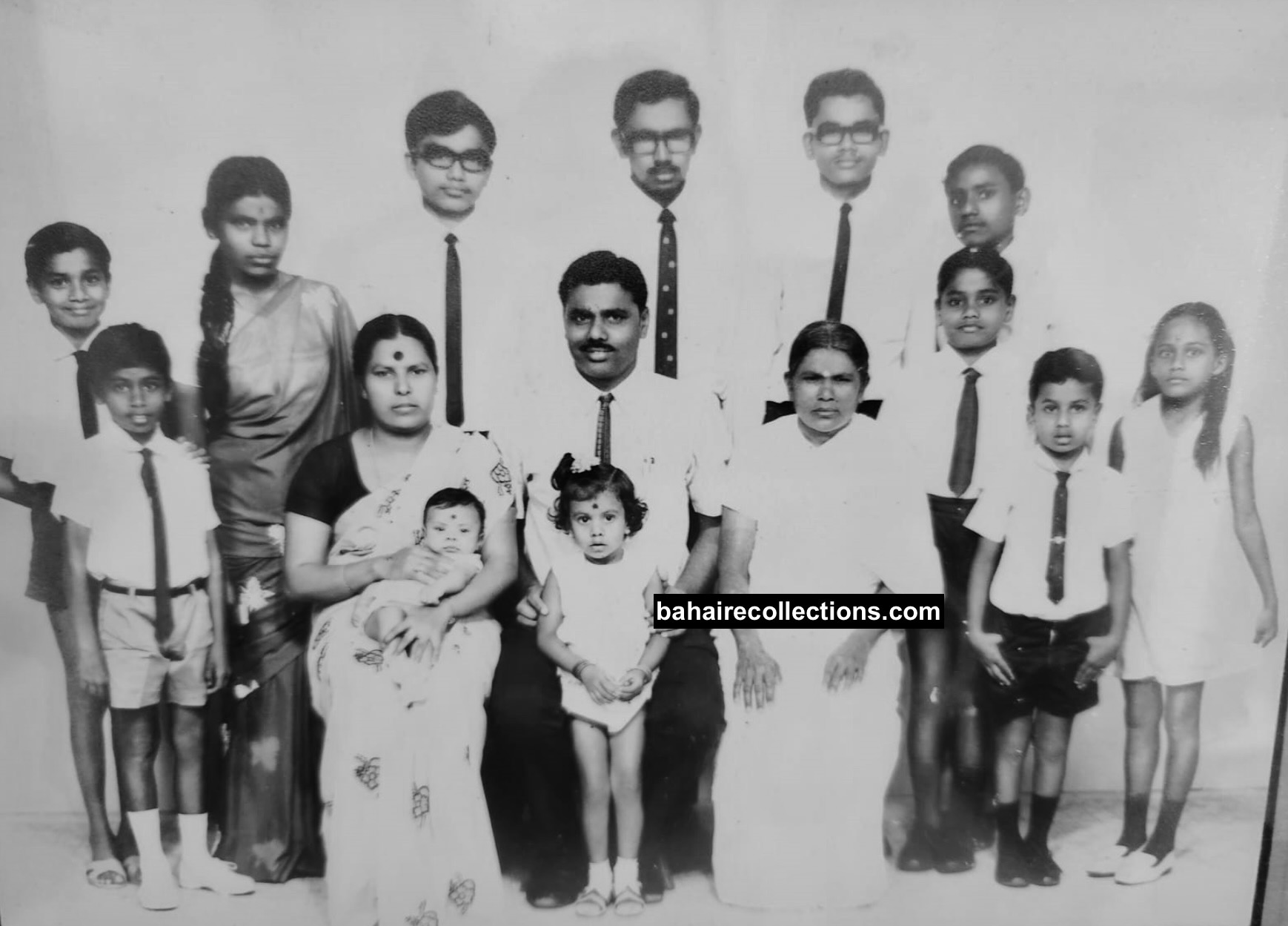
Dr. Singaraveloo standing at the centre in a picture taken with his siblings and extended family in Jasin. Seated in the centre is M. Palaniandy. To the right of Veloo is Kanesan who accepted the Faith on the same day with Dr. Singaraveloo.
Veloo’s meteoric rise in the Bahá’í Faith started in January 1965 when he enrolled in Form Six at the Malacca High School. At first, he was commuting daily from Jasin but soon took up accommodation in the Bukit China Hostel in Malacca town. He joined other Bahá’í youth in organising activities in the state of Malacca and emerged as a strong supporter of the Local Spiritual Assembly of Malacca and an asset to the community. The Assembly tasked this dynamic youth with organising meetings for believers in the Sungei Rambai and Merlimau areas which were said to be difficult places in those days. By Veloo’s own account, the greatest turning point occurred when he attained the presence of Hand of the Cause of God Ṭarázu’lláh Samandarí, yet one more diffuser of divine fragrances, who visited Malacca in July 1966.
While a student in Malacca town with limited money at his disposal, he was always desirous of attending some important gatherings held in Kuala Lumpur. There were moments when he had hitch-hiked on lorries to attend such Bahá’í gatherings held in Kuala Lumpur. Upon completion of his Higher School School Examinations at the end of 1966, he started his job as a temporary teacher in Jasin. He stayed in the home of a family friend bearing the same name as his elder brother Palaniandy. He took a great liking for the virtues of Veloo that he took Veloo as his own son.
In May 1967, he enrolled at University Malaya in Kuala Lumpur to pursue a medical degree. He stayed at the University Malaya’s Students Clinical Hostel in Section 15 in Petaling Jaya and became a member of the Petaling Jaya Bahá’í Community. He and Police Officer Mr. Leong Ho Chiew were put in charge of the lending library in that community. That was his first Bahá’í task there. Mr. N. S. S. Silan who was Secretary of the Local Spiritual Assembly of Petaling Jaya observed that Veloo was a very well-organised youth who never missed a single activity held in the Bahá’í Centre, even amid his university examinations. The family was very happy and proud that Veloo from humble beginnings had gained admission into a university to pursue a degree in medicine, which was a great achievement in those days when very few entered university. During holidays, Veloo will go to the house of Palinammal, his elder sister and share with her all the medical things he learned and how he was scared to touch dead bodies for examination.
While in Petaling Jaya, Veloo participated in all the gatherings held in Kuala Lumpur and traveling places on his Honda 50 model motorcycle, which Mr. Marappan, his elder sister Palaniammal’s husband bought for him. One aspect of Veloo’s involvement that would go down in history was his activities while still an undergraduate at University Malaya. It was also at this time that he served on the National Bahá’í Youth Committee. In 1968, he joined R. Ganasa Murthi in becoming the founding members of the University Malaya Bahá’í Society. The inauguration of the Bahá’í Society held on the evening of Friday, 11 October 1968 at the Arts Concourse of the University was a grand occasion with more than three hundred students turning up. Following the welcome address by Mr. R. Kanniappan who spoke on behalf of the President of the Society, Dr. John Fozdar, a member of the National Spiritual Assembly of Malaysia residing in Kuching, Sarawak gave an informative talk on the Faith and answered questions from the floor. Mr. Anthony Fernandez, Chairman of the National Spiritual Assembly read out a message from the national institution. Registrar of the University Mr. Lim Chung Tat remarked that he was pleased to learn of the high ideals of the Faith, which are much needed for the student population. Bahá’í literature was given to Mr. Beda Lim, the Librarian who also spoke highly of the Faith. On this occasion, the Society successfully distributed 4,000 copies of a souvenir brochure called the “World Commonwealth of Bahá’u’lláh” containing selections of Holy Writings. The Society had organised several high-level activities to bring the Faith to the attention of students, lecturers, staff, and the print media, as well as firesides.
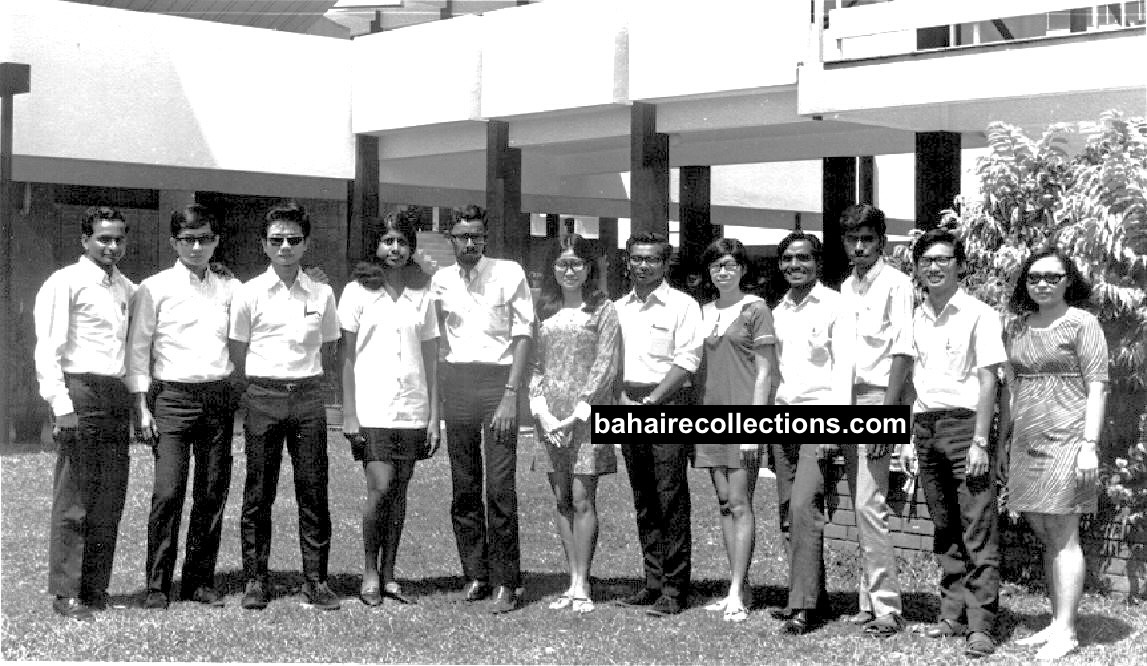
University Malaya Bahá’í Society, 1969. Standing at the extreme left is R. Ganasa Murthi. V. Parvathy stands fourth from left and the President of the Society, Veloo stands fifth from left. Miss Kung Joo Jong stands sixth from left, Kanthakumar seventh from left, Ramu Naidu ninth from left and Lum Weng Chew second from right.
When the National Bahá’í Youth Council, on which Veloo was a member met in September 1969 at the National Bahá’í Centre in Kuala Lumpur, a new body called the Inter-College Bahá’í Societies Council was elected with Veloo as its Chairman to focus specifically on the activities of the Bahá’í Societies in institutions of higher learning, which at that time were existing in the Technical College of Kuala Lumpur, University Malaya, and the Malayan Teachers College in Penang. The Inter-College Bahá’í Societies Council was to strengthen the existing societies through regular communication and guidance, the formation of new societies in other institutions of higher learning, and to follow up with graduates who have settled in other parts of the country upon their graduation. This Council organized an Inter-Religious Forums attended by the Varsity Christian Fellowship, the Buddhist Society, and the Islamic Society.
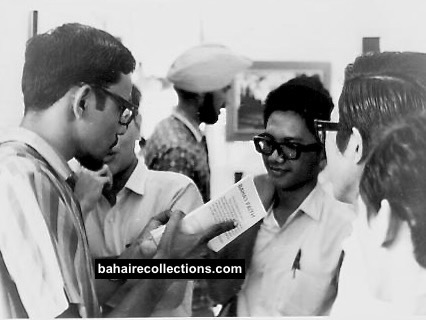
Veloo explaining the Faith to visitors at a Bahá’í book exhibition event in University Malaya.
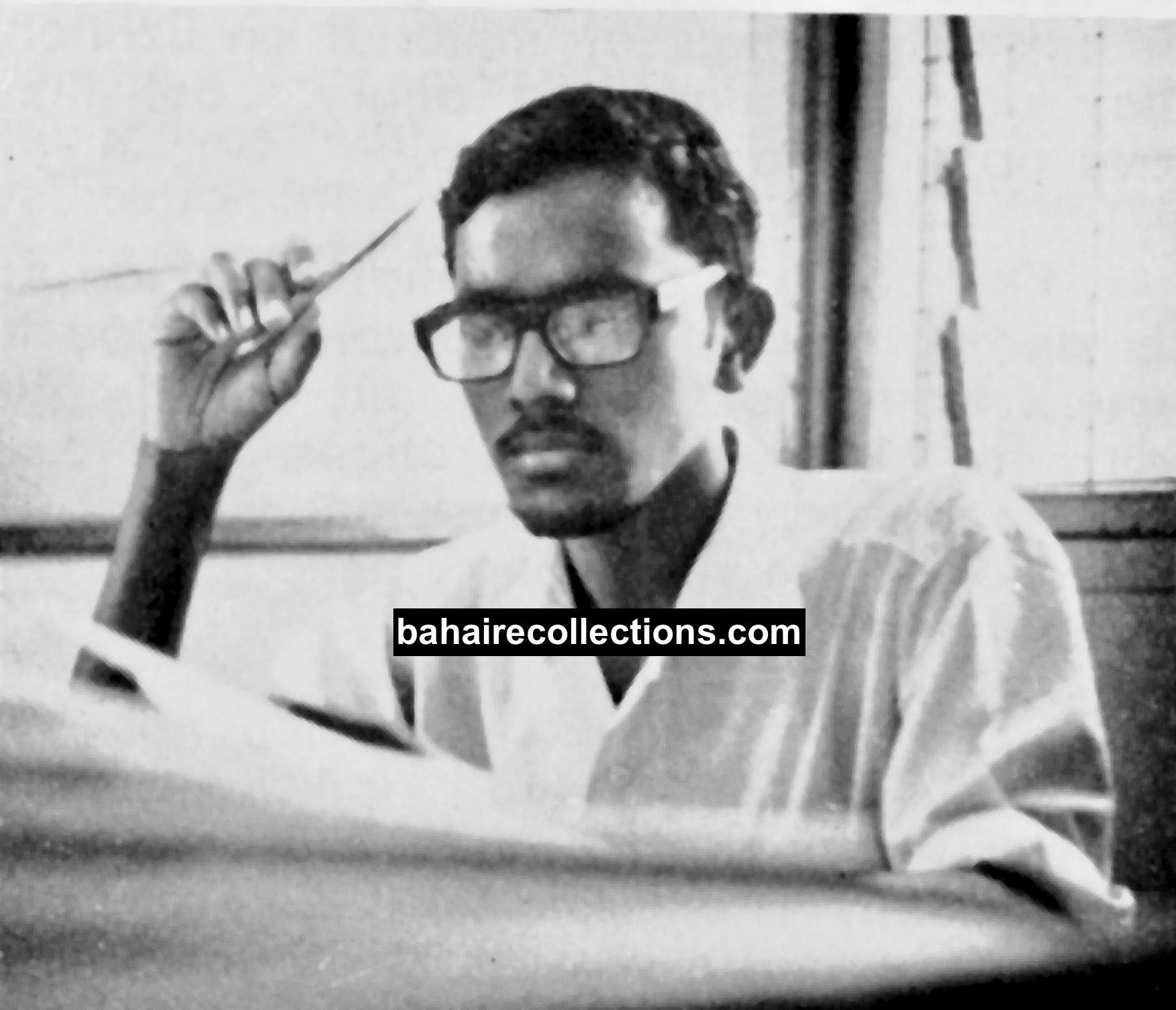
Veloo, Chairman of the Inter-College Bahá’í Societies Council in deep thoughts.
With believers graduating and taking up jobs elsewhere against uncertainty in the number of new believers entering the institutions of higher learning, the stability of the Bahá’í Societies was uncertain too. It was not an easy task to coordinate among the various Bahá’í Societies placed in different parts of the country. Against this background, the Council met monthly and kept in touch with other similar societies by reminding them to step up membership drives and pleading for regular reports. Regrettably, the University Malaya Bahá’í Society could not register the impacts as before in the later part of the 1970s owing to dwindling student intake and the internal circumstances of the campus.
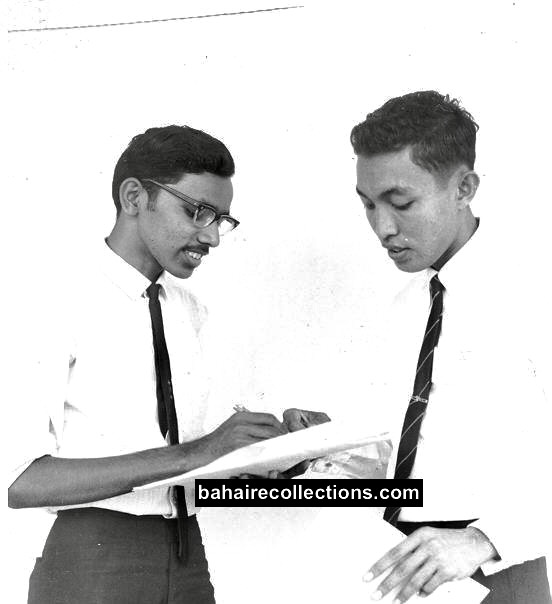
President of the University Malaya Bahá’í Society, Veloo at left, and Chairman of the Kuala Lumpur Technical College Bahá’í Society, Choo Yeok Boon at right, discussing.
While a resident in Petaling Jaya he kept attending training courses held at the National Teaching Institute in Malacca, one being the Pioneer Study Course that was held from 10 August 1969. During Riḍván of 1969, Veloo was elected to the Local Spiritual Assembly of Petaling Jaya. That was the first assembly on which he had served and remained until 1971. He had undertaken a short-term travel teaching trip to Sarawak during the vacation in early 1970. During weekends he used to ride on his motorcycle to outside communities to teaching or consolidation. In 1971, he was appointed to the Local Bahá’í Youth Committee and played the role of Youth Coordinator to encourage the youth to rise in service. He was often a speaker at some of the local events.
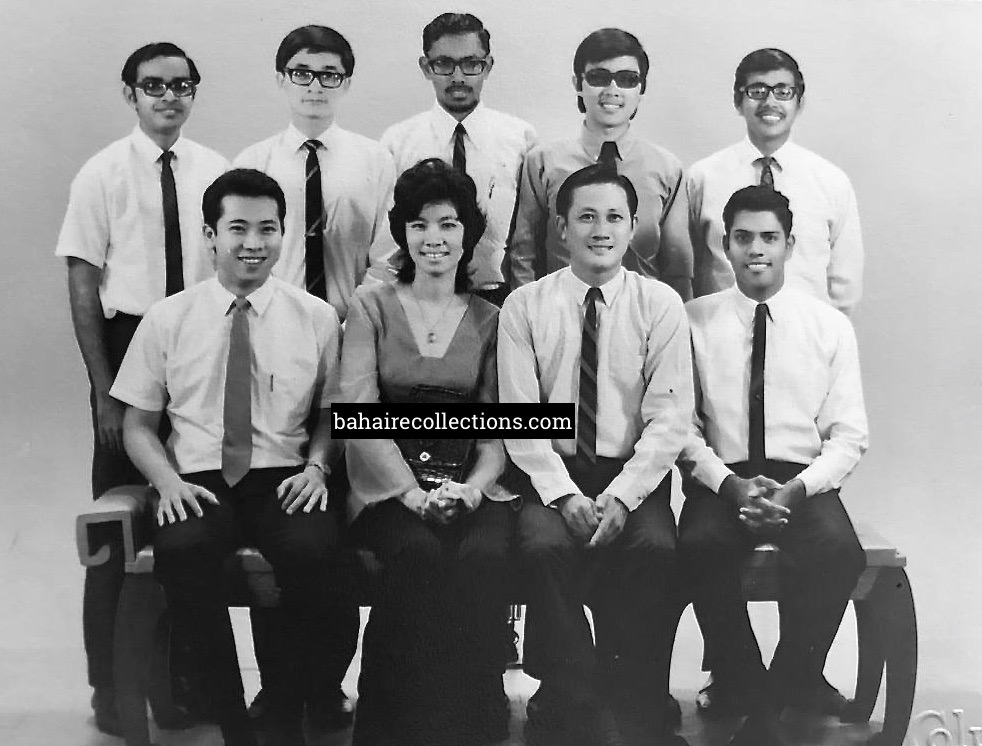
Local Spiritual Assembly of Petaling Jaya, 1971. Seated L-R: James Liew Ben Poh , Gina Leong, Leong Ho Chiew and Thanabalan. Standing L-R: V. Theenathayalu, Ying Hong Shuen, M. Singaraveloo, Lee Tiew Kiang and N. S. S. Silan.
When Veloo and another Nah Seang Ho believer graduated as doctors in 1972, the Local Spiritual Assembly of Petaling Jaya in its newsletter THE SATELLITE congratulated them and mentioned, “Now we really have some qualified people with us to consult…” Veloo was one of the very few medical doctors the Bahá’í community had at the time of his graduation. The ‘Bahá’í Centre Fund’ in Petaling Jaya was his brainchild.
Veloo acquired his MBBS from University Malaya in 1972 and obtained his Master of Medicine (MMed) from the National University of Singapore in 1976. In the year 1977 when he went to Glasgow in the United Kingdom to pursue his MRCP from the Royal College of Physicians. But to go to the United Kingdom he and his wife could not afford air tickets. He had to borrow money to pay for his tickets and for living expenses there. While in Glasgow, Veloo worked as a Geriatric for 6 months and then had another interview to get into the Glasgow Royal Infirmary and worked as a Medical Officer and he managed to pay back the borrowings.
EARLY DAYS IN JOHOR BAHRU
Upon acquiring his MBBS in University Malaya in 1972 he first served as a houseman at the Johor Bahru Government Hospital and went to work in the town of Muar in 1973 and returned to Johor Bahru for good in 1988. During his first stint in Johor Bahru in 1972, he gave the strongest support for the local activities and was elected to the first Local Spiritual Assembly in Riḍván 1972. In 1972, a Bahá’í Centre was made available at 67, Jalan Vijaya, Century Garden. The Local Assembly also had its own newsletter called “Causeway.” This community was given the responsibility of organizing the first Winter School in the Vocational School in Johor Bahru from 21 to 25 December 1972, and a Public Talk at the Diamond Jubilee Hall in Johor Bahru to coincide with the Winter School. That was the first time this community was given the task of organising a national event. From this period onward Johor Bahru emerged as one of the strongest communities in the country.
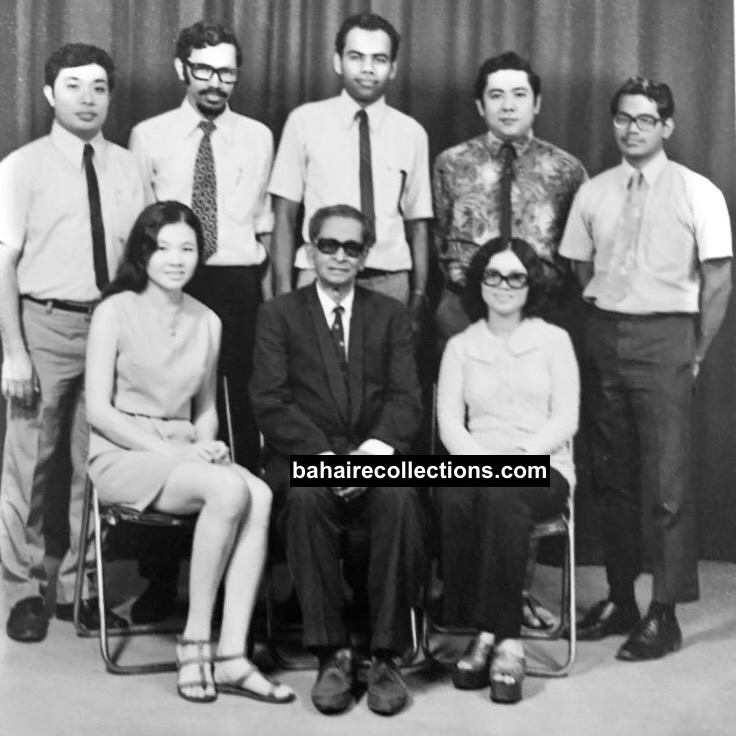
Local Spiritual Assembly of Johor Bahru for 1972. Standing L-R: Alan Tan, Dr. Singaraveloo, Perumal, Jack Tan and N. Sivalingam. Seated are L-R: Foong Meng, Ghandhi and Catherine Wan.
Veloo was one of the few twenty friends selected to attend the first Nine Day Institute in Malaysia conducted by Mr. Caldwell at Port Dickson from 8 to 16 December 1972. The participants were members of the national institutions of Malaysia and Singapore and Auxiliary Board members. Impelled and fortified by reflections learnt in that highly charged gathering, Veloo volunteered to be a coordinator of a weekend spiritualization course held at the United Farm in Sungei Tiram, Johor Bahru from 25 to 27 January 1973. Ten years later he coordinated another spiritualization institute in Kulai town on 28 and 29 April 1983 in English.
Throughout his stay in Johor Bahru, Veloo had from time to time participated in activities organised in the Bahá’í activities in Singapore.
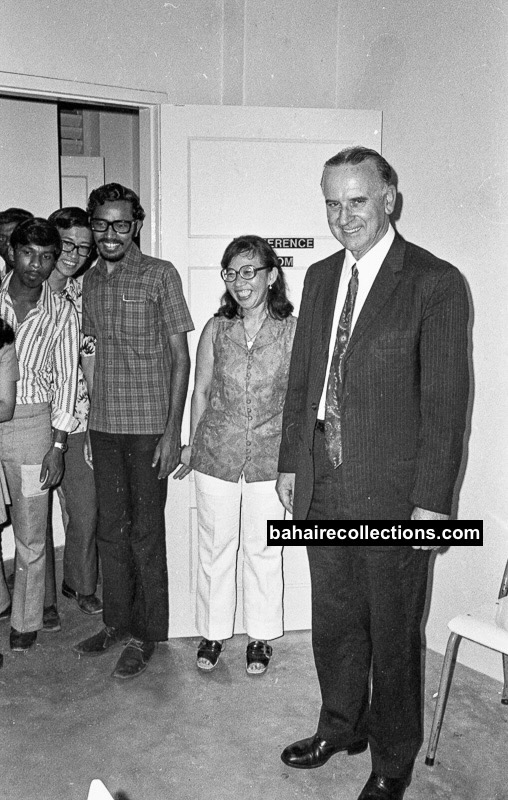
Dedication of the new National Bahá’í Centre of Singapore in 1973, graced by Hand of the Cause Collis Featherstone, standing at the extreme right. To the right of Mr. Featherstone are Chairperson of the National Spiritual Assembly of Singapore Mrs. Rose Ong, Dr. Singaraveloo and Benedict Chee Tat Hong. (Photo courtey: Gregory C. Dahl)
ON THE NATIONAL INSTITUTION
Meanwhile, Veloo was elected to the National Spiritual Assembly of the Bahá’ís of Malaysia during a by-election held on 16 February 1973 to fill the vacancy created by Mrs. Elizabeth Gibson, Assistant Secretary of the national institution who left Malaysia for Vietnam to join her husband. Veloo, a resident of Johor Bahru was elected to the National Spiritual Assembly in that same by-election. That night itself he was informed of the election results and requested to start immediately to attend a meeting of the National Spiritual Assembly to be held the following day in the presence of Hand of the Cause of God, Dr. Raḥmatu’lláh Muhájir. He travelled by train the whole night and participated in his first meeting of the national institution. And that first meeting itself was with Dr. Muhájir who was consulting the national institution on Malaysians assisting Laos, Bangladesh, Thailand, India, and Ceylon. Being exposed to such a brainstorming session for the first time, Veloo had murmured these words to his fellow members during a break session, “This is too much, just too much!” Little did he realise that he would be in that institution for decades to come. Membership in the national institution opened a new chapter in Veloo’s Bahá’í service. One of the earliest activities in which he was involved as a member of the national institution was coordinating a workshop on the subject of the Universal House of Justice, National Spiritual Assembly, and Local Spiritual Assembly at the Summer School held in Ipoh town in July 1973.
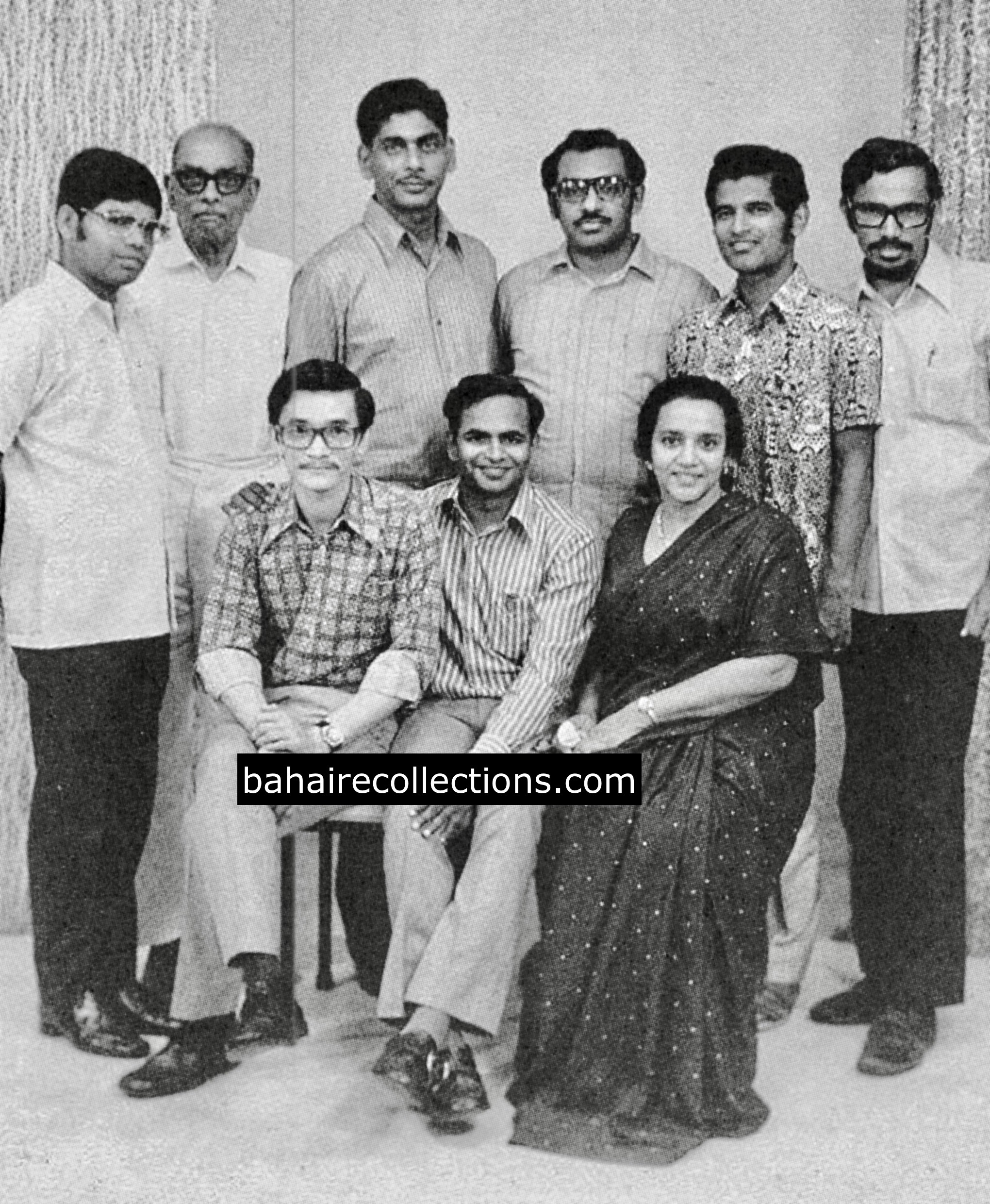
National Spiritual Assembly of Malaysia for 1973. Standing-L-R: A. P. Arumugam, K. Rajah, S. Nagaratnam, Dr. M. M. Sreenivasan, Isaac D’Cruz, Dr. M. Singaraveloo. Seated-L-R: Yin Hong Shuen, R. Ganasa Murthi and Mrs. Shantha-Sundram.
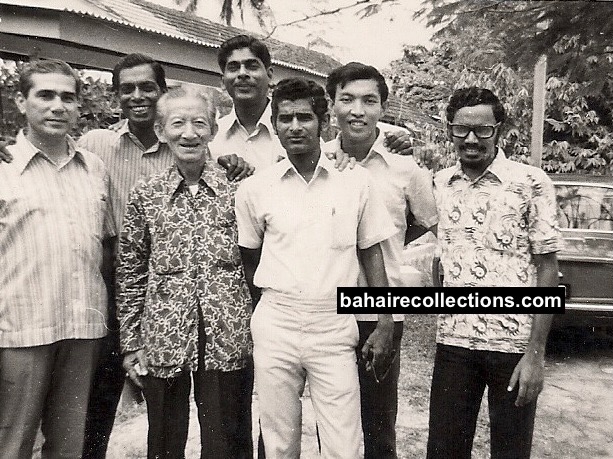
Some elders in the Faith. L-R: Dr. John Fozdar, Inbum Chinniah, Yankee Leong, Nagaratnam, Isaac D’Cruz, Choo Yeok Boon and Dr.Veloo
That was just the beginning of the many more responsibilities he had undertaken while a member of the national institution. He remained on this august body until the year 1976 when he served as Assistant Secretary of the institution. In 1977, he went abroad to further his studies in medicine and returned in 1980. In 1981 he was again elected to the institution. He shouldered numerous heavy responsibilities throughout his tenure on this august body while juggling a young family and an increasingly demanding career. In 1974, the Universal House of Justice appointed him to the Asian Continental Pioneering Committee, and he also served as an Assistant Registrar of Marriages. Serving as Chairman of the National Consolidation Committee, in the 1980s while still on the national institution Veloo travelled around the country meeting communities to strengthen them in the Faith.
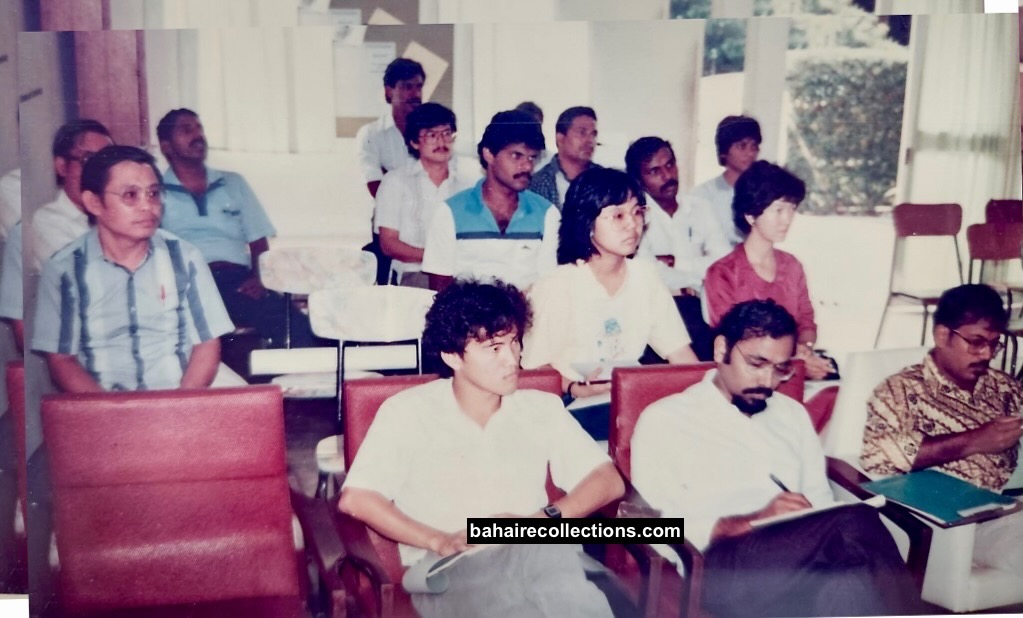
Stop over in Kuantan town community for deepening session in 1984 during a roadshow across the country . Dr. Veloo is in the middle with Krisnamurthy, at his left.
He was also tasked with collecting and archiving Bahá’í audio visual materials produced in the country. Prominently he was at the forefront of negotiations with those in authority on many areas of Bahá’í interest. He would go on to serve on the National Assembly for 43 years, except for the brief period when he was overseas. He served as its able Chairman from 1984. Having taken up manifold and heavy responsibilities for the Faith, which only increased as years went by, coupled with additional pressure building up in his profession career, he asked to be relieved from the national institution, which the Supreme Body accepted. Veloo then resigned effective the National Convention of 2016. The National Spiritual Assembly was saddened to see a resourceful Chairman with a high sense of justice and a strong defender of the Covenant leave this august body. He was the most loving person, and yet when he spotted any sign of malice or mischief, he opposed it with every fibre of his being. At the time when Veloo left the national institution, he had the pulse of the community at his fingertips.
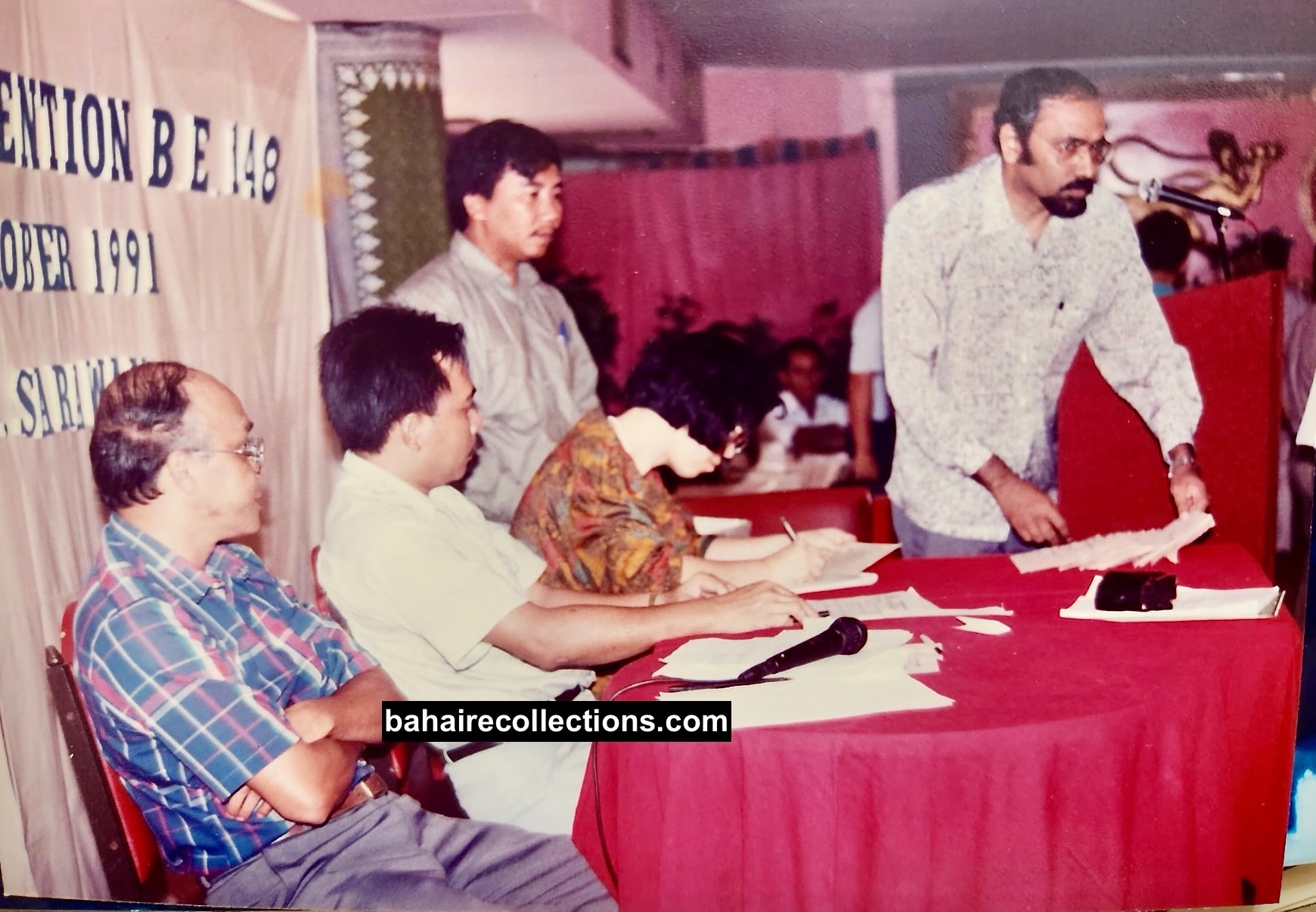
Dr. Veloo at right, at the Unit Convention of Sarawak in 1991.
Narrating his manifold services on many fronts while he was a member of the institution will require a book by itself. Although he left the august institution, he was always there whenever needed to carry out some high-profile tasks and activities at the national level and remained a strong supporter of the institutions. It needs to be mentioned that Veloo had left behind remarkable services wherever he resided and in whatever institution served.
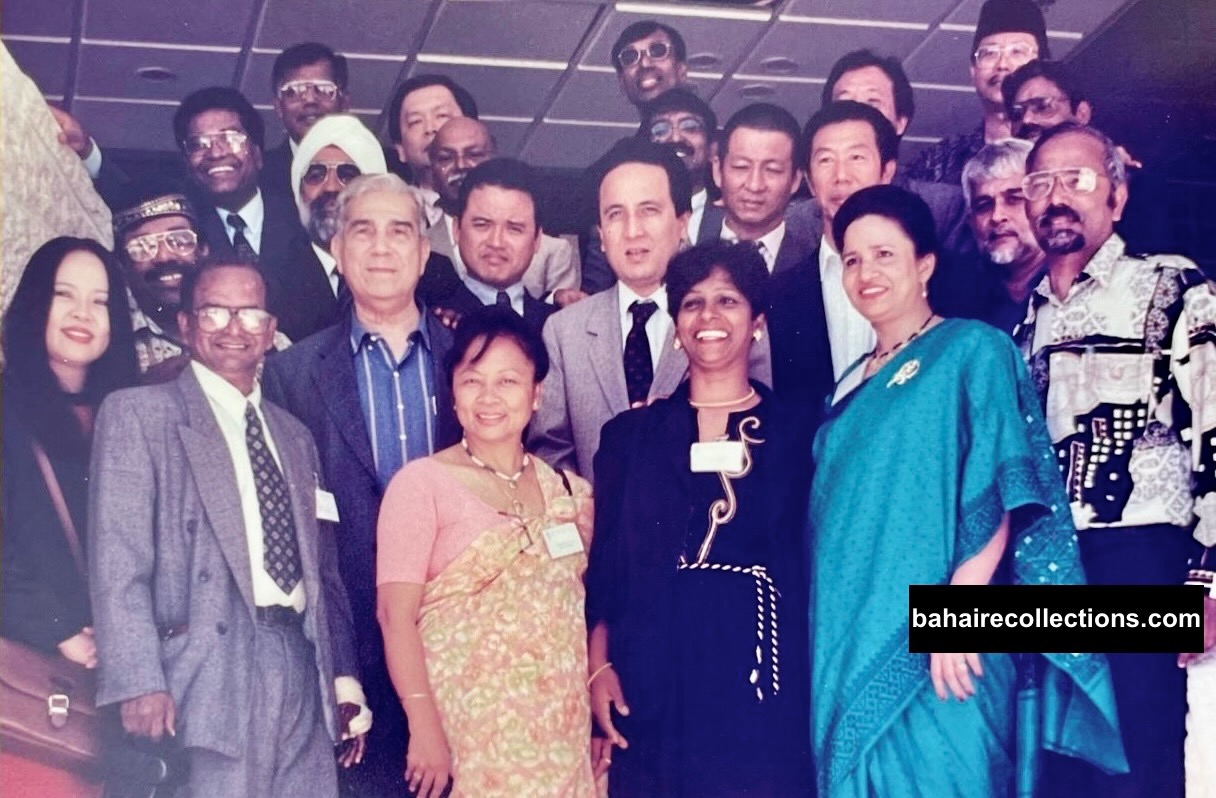
International Convention of 1998. Dr. Veloo is at the extreme right in simple Batik shirt, along with delegates of Malaysia and other countries.
EARLY DAYS IN MUAR
Veloo’s second phase of service in his career was in Muar started in 1973 when he was posted as a Medical Officer in the Government District Hospital of Muar for a year. There he joined Shanmugam, Karuppiah, and Radhakrishnan in strengthening the community. Injecting a new spirit into the Muar community he became a driving force there. He went to serve in Johor Bahru in 1974 and returned to Muar to start his career this time as Chief Medical Officer on 1 July 1980. It was also on this same day that Kanagaratnam Chinnasamy moved to Muar from Shah Alam town and started his career at S. T. Microelectronics, a multinational company based in Muar. On the very following day itself, these two started meeting the local believers there, to give an added strength. With the arrival of Veloo, the Faith gained a stronger footing there. A grand Baháʼí Naw-Rúz party was held at his residence in 1981, with more than 120 believers and guests attending. Guests included medical doctors, lawyers, teachers, and prominent members of the community. That was the beginning of annual Naw-Rúz dinners that he hosted in Muar and later continued in Johor Bahru.
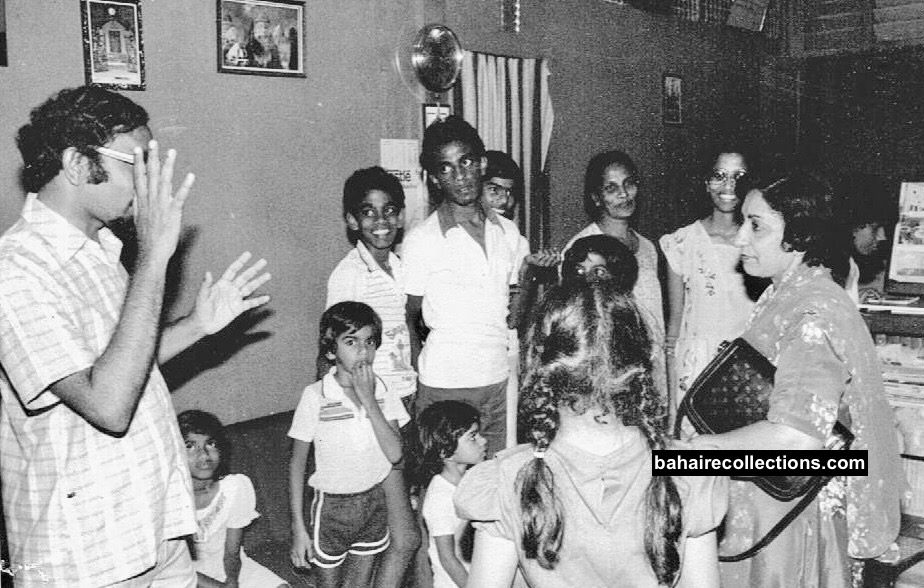
Dr. Veloo at left conversing with a visitor from Indonesia on 12 December 1983 at the home of Karuppiah in Muar.
In Riḍván 1981 he was elected to the Local Spiritual Assembly of Muar and held the position of Chairman during his stay in that community. More deepening classes and teaching trips were organised. His government bungalow and the home of Mr. Karuppiah were used as the meeting places. With the push coming from Veloo, the community acquired its own Bahá’í Centre. Soon some 50 believers turned up for the Nineteen Day Feasts. Veloo undertook regular trips to the rubber plantation settlements or estates and smallholdings in the interiors to meet up with isolated believers to deepen them on the tenets of the Faith. Before the coming of Veloo to Muar it was a community made up predominantly of Tamil-speaking friends. His wife Ng Kan Hoe, being of Chinese descent played an active role in teaching the Chinese people and it did not take long before many Chinese-speaking families came into the Faith. That changed the demographic representation of the Faith. It was since the coming of Veloo to Muar that the Faith was taken to those in the higher echelon, given his prestigious status as a Chief Medical Officer in Muar Government Hospital. He too was invited to interfaith activities in Muar.
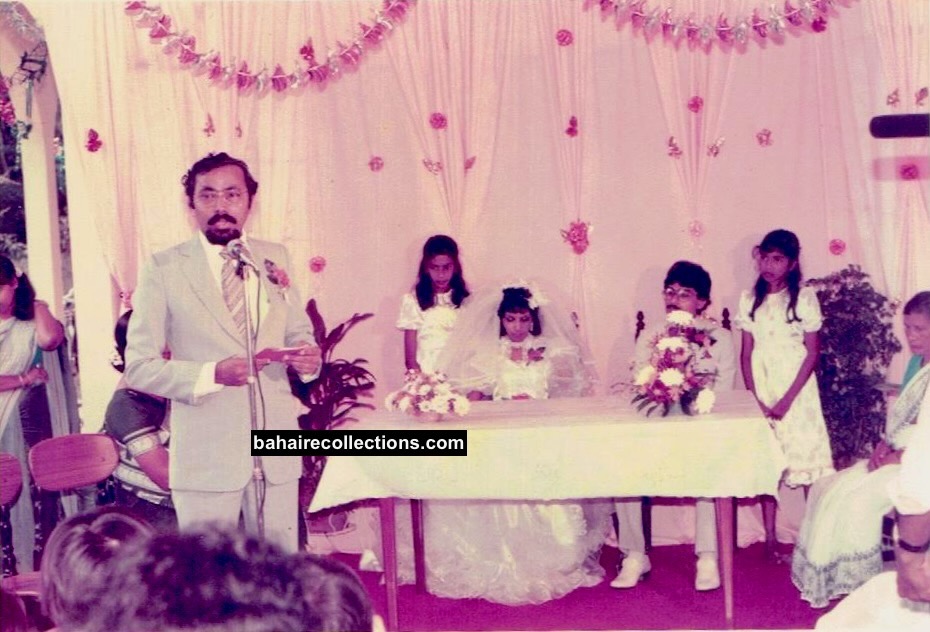
Conducting wedding of Karuppiah’s daughter Saroja Devi and Kumaran in Muar on 11 April,1986.
During his service in Muar, he successfully set up the very first Intensive Care Unit (ICU) at the hospital. As a Physician in Muar, he served the then Menteri Besar (Chief Minister) of the state of Johor and even accompanied him to the United Kingdom for medical treatment, flying in a Concorde Supersonic Airliner. In 1988 he moved to Johor Bahru for good.
LATER DAYS AT JOHOR BAHRU
During his second stint in Johor Bahru (1974 to 1977), the community became one of the strongest in the country. He lived a simple life, renting a room in a house that belonged to an Indian family. He married Ng Kan Hoe on 8 August 1975 at the Johor Bahru Diamond Jubilee Hall, and she emerged as Veloo’s strongest supporter in all his activities. The Johor Bahru community was given the responsibility of organising the second Winter School in December 1974.
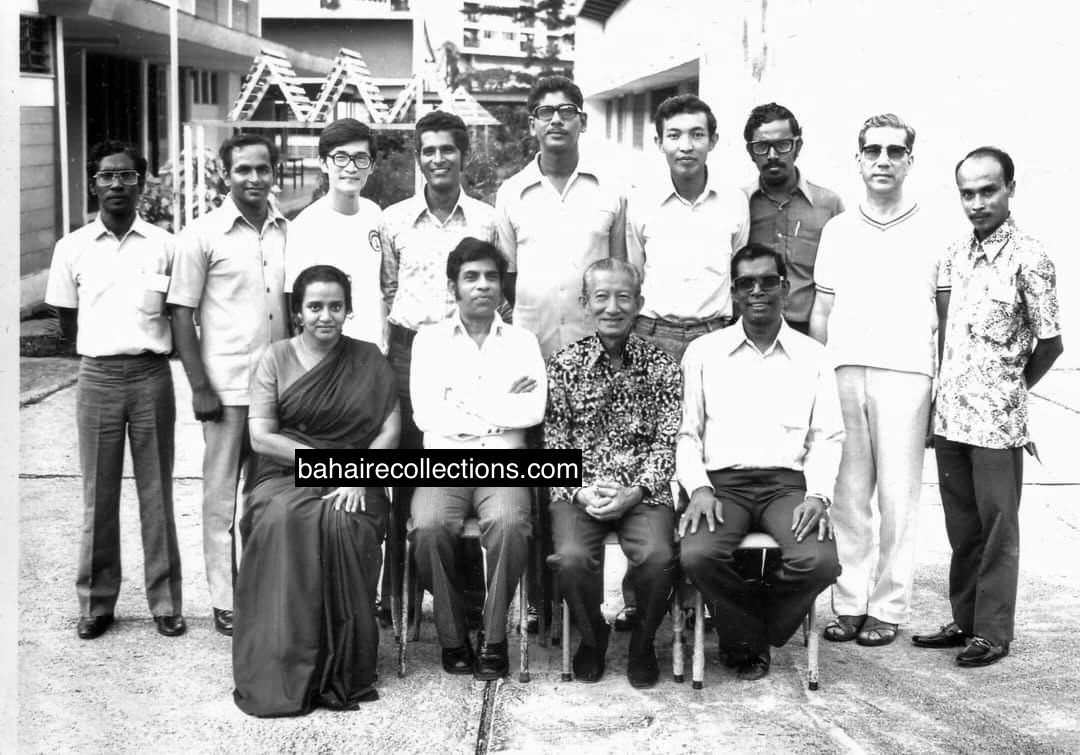
At Winter School in Johor Bahru, December 1974. Standing are members of the National Spiritual Assembly, L-R: Maniam, Ganasa Murthi, Yin Hong Shuen, Isaac D’Cruz, S. Nagaratnam, Captain Choo Yeok Boon, Dr. Singaraveloo, Dr. John Fozdar, and Ragai Lang. Seated L-R: Auxiliary Board member Shantha Sundram, Counselor Dr. Chellie John Sundram, Counselor Yankee Leong, and Auxiliary Board member Inbum Chinniah.
His third stay in Johor Bahru that started in 1988 lasted till his passing. He served in the Sultanah Aminah Hospital as Head of Medicine. This was the period filled with his tense activities on many fronts of service, including membership in the Local Spiritual Assembly, the National Spiritual Assembly, and several of its national committees.
It was while serving in the Sultanah Aminah Hospital that Veloo became a personal physician to the late Sultan of Johor, His Majesty Sultan Iskandar Ibni Almarhum Sultan Ismail who had reigned as the eighth Yang di-Pertuan Agong, the constitutional monarch of Malaysia, from 1984 to 1989.
Veloo also served as a family physician to the Sultan of Johor, His Majesty Sultan Ibrahim Ibni Almarhum Sultan Iskandar who is today the 17th King of Malaysia.
He joined KPJ Johor Specialist Hospital in 2002 and served there as a Specialist Consultant for 21 years until ill health forced him to relinquish his career.
Veloo made himself known to the wider world as a believer in the Bahá’í Faith. On account of his loyalty to the country and the government, His Royal Highness the King of Malaysia awarded Veloo with national medal of Kesatria Mangku Negara (KMN) on 5 June 1993, and on his great contribution to the field of medicine and society, His Royal Highness the Sultan of Johor whose family he was a personal physician, conferred upon him the state award of Darjah Mahkota Johor carrying the title of Dato’ on 7 April 1994. The title Dato’ is usually conferred by the ruling monarch to individuals who have contributed significantly to their community or profession. A few weeks later was the National Bahá’í Convention the Chairman of the convention announced that Veloo has been awarded the title of Dato’. The delegates spontaneously stood up and applauded. Veloo immediately took hold of the microphone and said, “Friends, never mind what the chairman of the convention just said. Whatever titles I may have, I am still the same Veloo and would like to be called Veloo.” That was the kind of down-to-earth man he was!
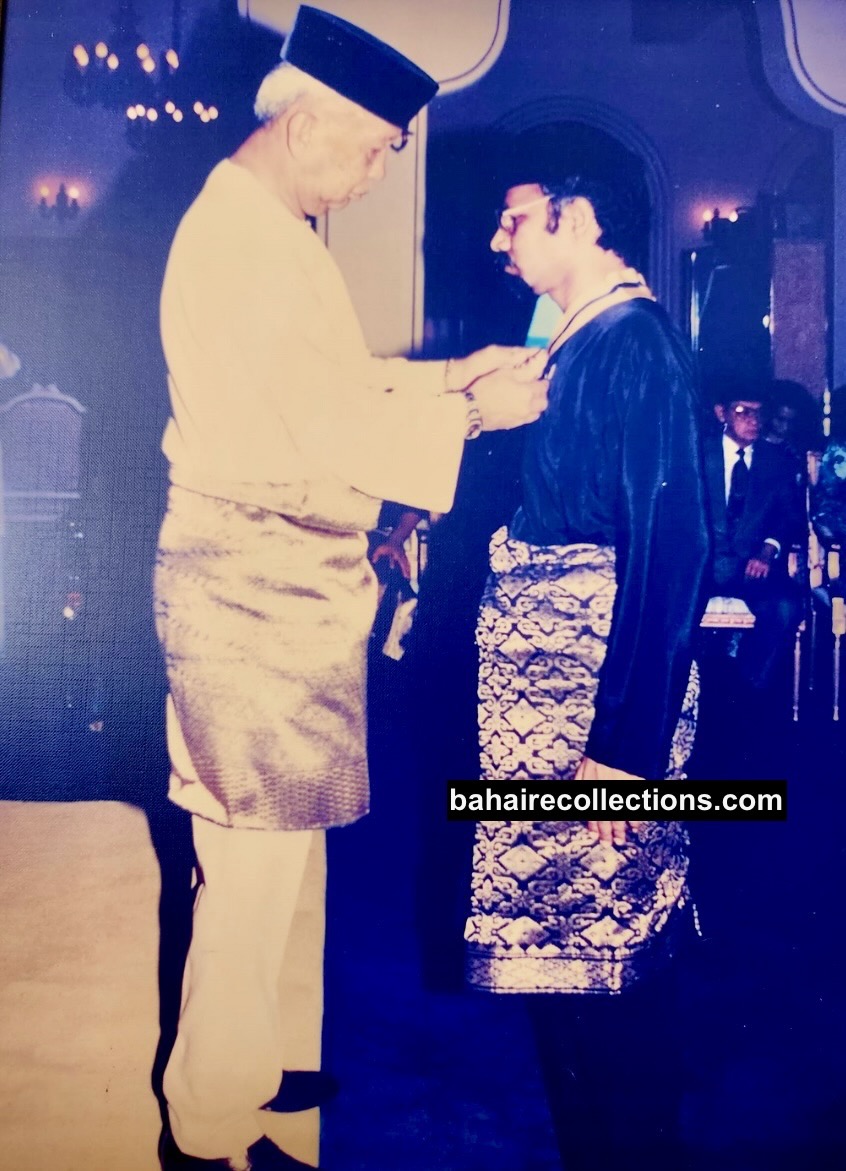
The Sultan of Johor awards the title of Dato’ to Dr. Singaraveloo in April 1994.
His medical profession created inroads into people from all walks of life, ranging from the common man to those eminently placed in society, including the royal family of the state of Johor, as well as those in the highest authority in the country. He had moved closely with all the Chief Ministers in Johor during his tenure as a physician. One of them became Prime Minister. He had also moved closely with two other Prime Ministers in the course of his career and Bahá’í activities, and they all had known him as a Bahá’í.
The Local Spiritual Assembly of Johor Bahru used to organise Naw-Rúz dinner on a grand scale in prestigious hotels, and Veloo used to invite those eminently placed in society. Many in the highest echelons had attended, including the Chief Minister and his entourage.
While his primary practice was at KPJ Johor Specialist Hospital, he was involved in certain haemodialysis centres for which he had a great passion. The places where he had offered his services while still at the KPJ Johor Specialist Hospital were the Rotary Club of Kota Tinggi Haemodialysis Centre, the Rotary Club of Johor Bahru Haemodialysis Centre, and the Rotary Haemodialysis Centre in Masai town.
A PASSIONATE PHYSICIAN
He believed that every person, regardless of their socioeconomic background, deserved access to quality medical care. Veloo may have taken up the medical profession for his personal satisfaction but ended up in providing service for society in the spirit of “Work is worship; and service is prayer.” Throughout his illustrious career, Veloo touched the lives of countless patients, earning a reputation for his unwavering commitment to their well-being. There is no family known to him that he has visited without giving free medical consultation for all members and giving health tips. For those living close to the hospitals he was serving – Muar and Johor Bahru, he would ask them to visit him. It so happened that at the registration counters of the hospitals, these patients would ask to see Veloo.
It is no exaggeration to say that he made the medical profession proud and was a great comfort and consolation to his patients. Over a period of time, he developed a strong network among government and private hospitals in the country. Whenever he was informed that someone he knew was admitted into a hospital in some corner of the country, he would call his contacts in that hospital and ask for close attention for that patient. Veloo always followed up with the doctors until the patients were discharged. There have been several instances when Veloo had driven outstation, in the middle of the nights, to visit patients and share his medical opinion with the doctors on duty.
Veloo regarded his patients above himself and often had little rest. Most of the days he worked even during lunch hours. Even when he was not well and resting at home, he would still take calls and visit patients in hospitals. Whenever he went for his ward rounds, he would sit down with the patient and give confidence and cheerfulness. He was truly a physician of a rare kind. He was on several sub-committees of the Malaysian Medical Association of which he was a life member. He was also chairman of the Johor branch at one time. He was involved in training medical students and the young doctors. Single-handedly and in association with other medical practitioners Veloo has written many research papers on health matters and presented them at various platforms, both local and international.
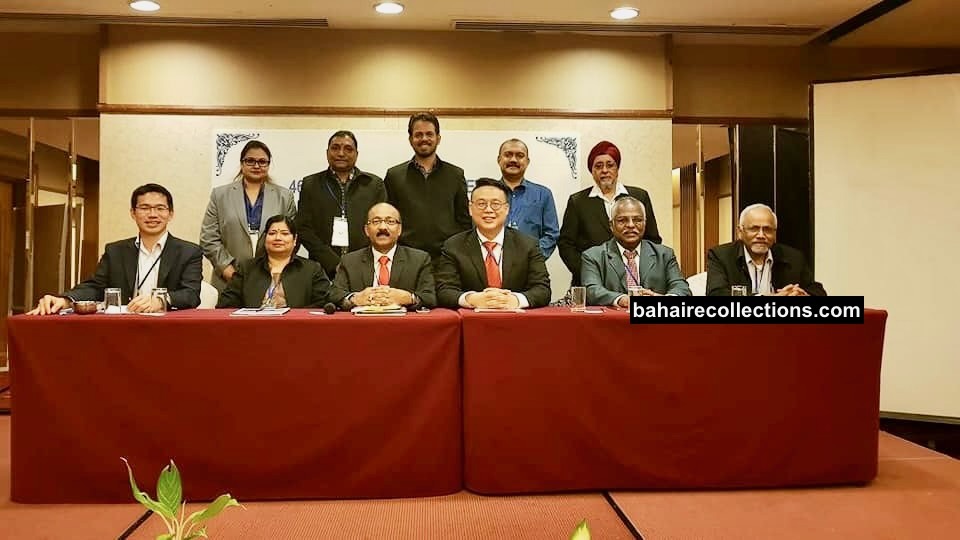
Dr. Singaraveloo seated at the extreme right among committee members of the Malaysian Medical Association Johor Branch for 2018-2019
SERVING HUMANITY
Veloo, as an active Rotarian had been deeply immersed in giving a helping hand to those needy. His full commitment to social work started during the early days of his medical career in Muar town. He was President of the Rotary Club and involved in numerous charity activities. There he started a Society for Diabetic Patients and ran a series of talks on Diabetes Management, an activity he continued for many years to come. He also chaired several symposiums. One of the celebrated events was his chairing a symposium on Diabetic Management on 19 October 2012. This was an event jointly organized by the Johor Bahru branch of the Rotary Club and the Malaysian Pharmaceutical Society. Many were events of such kind in which Veloo participated. He also assisted the Rotary Club of Batu Pahat town in setting up the Hemodialysis Centre.
Health talk on diabetes delivered in the Malay language by Dato’ Dr. M Singaraveloo, Physician KPJ Johor Specialist Hospital.
One of the most talked about projects is the Kidney Dialysis Centre that he, along with Dr. Kanwal Nain Singh, a long-time colleague of Veloo from the Muar days and a few other Rotarians set up in WISMA Abad in Johor Bahru in about 1995 by raising RM 1 million. It was through the encouragement and full support of the Sultan of Johor, His Majesty Sultan Iskandar Ibni Almarhum Sultan Ismail that this centre was set up. The Sultan himself donated 3 costly dialysis machines. There was a health assistant and two nurses working on three shifts, providing for 70 patients. That was the first ever such a center set up by any Rotary Club in Malaysia. Today almost every Rotary Club has set up such dialysis centre following the footsteps and initiative piloted by Veloo and his fellow medical practitioners.
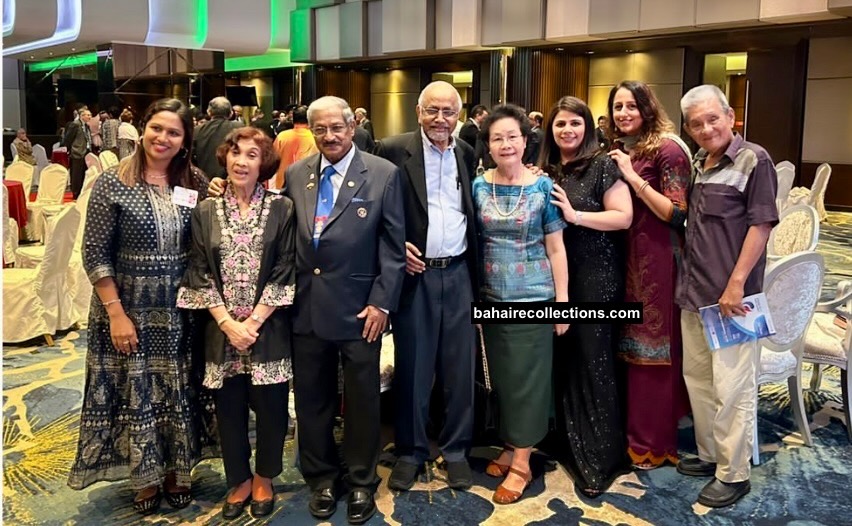
Dr. Singaraveloo and his wife Ng Kan Hoe in the middle of the picture, at a Rotary Function in Johor Bahru.
Veloo, Dr. Kanwal Singh and a few Rotarians saw that many were terminally ill and bed-ridden at their homes without any care. They then set up a Palliative Care Centre for them. Veloo went one step ahead and secured two beds at the Sultanah Aminah Hospital in Johor Bahru, for those patients in critical condition. Today it has evolved into a centre managed by two full-time medical doctors and three nurses who all visited them at their homes. This was fully funded by the Rotary Club.
On 1 April 2018, the Rotary Club Johor Bahru President, Datuk Teo Shiok Fu and Veloo, as Past President attended the event to launch the Tunku Laksamana Johor Cancer Centre. The Ceremony at Persada Johor International Convention Centre in Johor Bahru was graced by His Majesty Sultan Ibrahim Ibni Almarhum Sultan Iskandar, Sultan of Johor. This was a project for which Veloo gave his fullest support.
Among his many other involvements are being the state and national examiner for MRCP examination in Malaysia, being an Associate Professor at the Monash Medical Clinical School at Johor Bahru as well as taking on the role as the State Medical Officer of St. John Ambulance of Johor state. He was also involved in setting up an Information Technology College in Johor Bahru in late 1990’s, which is running till today to support in community education.
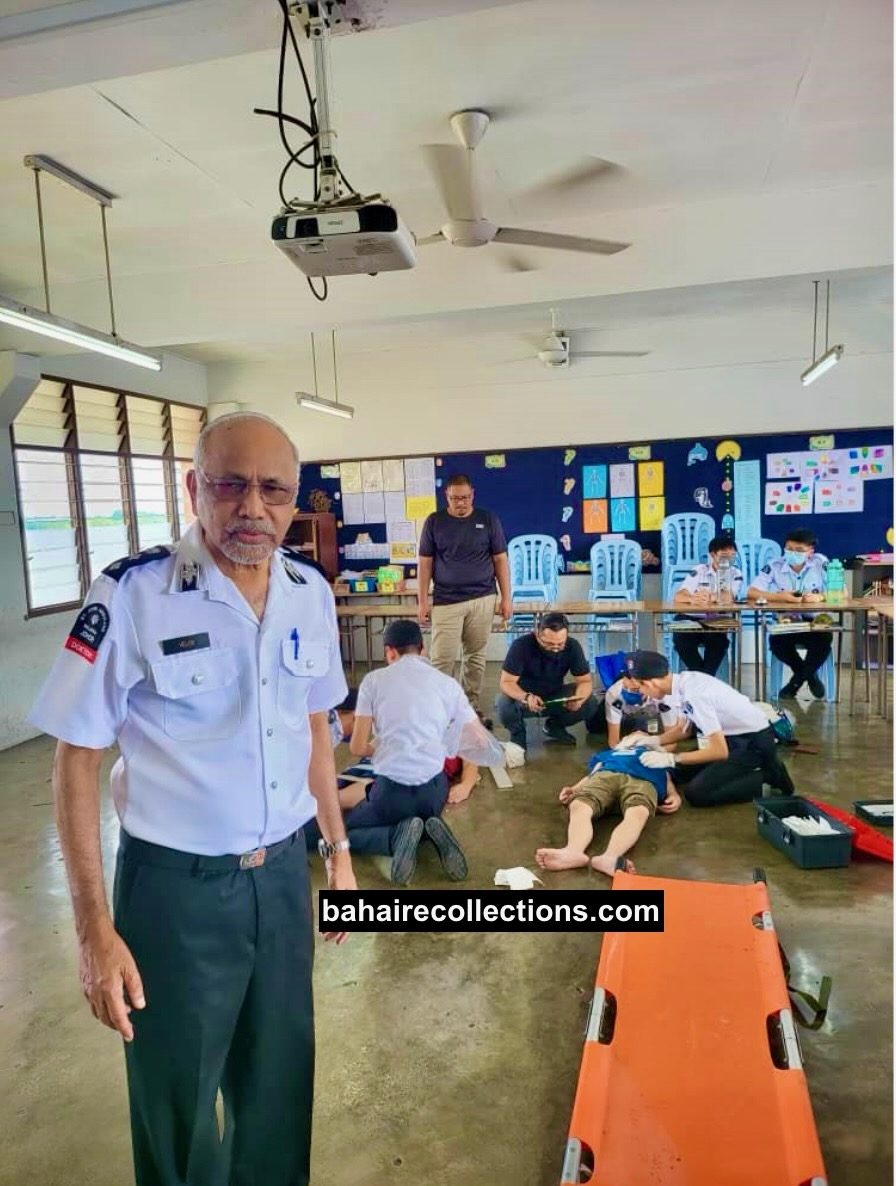
Dr. Singaraveloo a St. John Ambulance activity.
HIS HEART WAS FOR THE POOR
The most outstanding virtues of Veloo was his sincere and genuine care for the downtrodden and the unfortunate in society. His magnanimous heart was always for the poor and always regarded the needy above himself. This concern for the poor stemmed from his own poverty faced during his childhood days, which he openly shared with close friends. There was a time when the family could not send Veloo to school for lack of financial means. One day his father Muthusamy locked Veloo in a room to prevent him from going to school as he had no money to pay his school fees. Veloo’s elder brother Palaniandy broke open the door and sent Veloo to school. Veloo’s elder sister Palaniammal was married to Mr. Marappan who, along with Veloo’s brother Palaniandy paid his school fees.
On the way to school during Veloo’s primary and secondary schools, he used to sell cakes made by his mother and elder sister. On one occasion he sold everything but somehow lost the money. He was so scared of his mother whom she knew would be furios. But his sister protected him from the mother. When Veloo started to work, he was a rock for his wider family and took their burdens upon his shoulders. In all the places he worked, Veloo showed special interest in the welfare of his subordinates.
While at the KPJ Johor Specialist Hospital, he would waive his consultation fees for poor patients, only requiring them to pay the hospital charges. There were many wealthy patients who were impressed with his services and wanted to reward him privately, which he politely refused. When they insisted, he would ask them to donate to charity. There were many mornings he was greeted by hampers placed at his doors, which he would send over to the charity homes. He never used his high-level contacts for his well-being but got them to assist those in need instead.
ACTIVE PROMOTER OF THE CAUSE
It is in historical memory that Veloo single-handedly introduced the Bahá’í Faith to the widest circle of people eminently placed in society by mentioning the name of Bahá’u’lláh at every given opportunity and endeavouring to live the life of a true Bahá’í. He always introduced himself openly as a believer in the Bahá’í Faith. He endeavoured to live the Bahá’í in his private and public life. His marriage to Ng Kan Hoe was another of his belief in inter-racial marriage to unite people of different races. She was his constant support throughout his married life.
While with high-ranking politicians he made himself known as one who would not involve himself in partisan politics or political discussions. Yet he demonstrated all his life his strongest loyalty to the government of the country, a cardinal teaching of the Bahá’í Faith.
SIMPLE AND YET MAGNANIMOUS
He felt comfortable and happy under all circumstances and in all circles- with the labourers in the estates, the aboriginal people in the deep jungles, and those elite in the town. There is an incident stamped in the memory of some simple believers that needs to be brought to remembrance. In 1974, he went unannounced to Jerampadang Estate in the state of Negeri Sembilan to offer support for a teaching camp that was organised by the simple believers there. And he passed a night among them, sleeping on a straw mat that was spread out on cement floor. His folded arm was his pillow for the night. The estate folks could not believe what they saw, a doctor of that stature at one with them. Simplicity was inborn in Veloo.
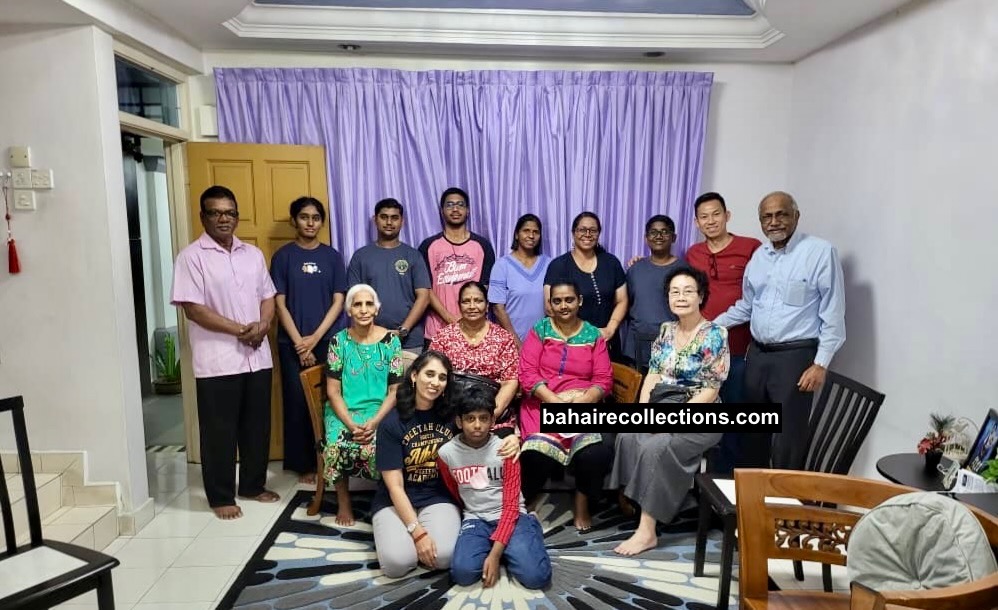
Dr. Singaraveloo and his wife at the extreme right, joining Pulai Perdana in Kangar Pulai neighbourhood in January 2023 for a Feast gathering.
Even in later years, he was the same Veloo. Despite the high esteem he was held in, everything around him was simple and modest – his attire, lifestyle, and the house he lived in, to name a few. Some friends even urged him to move into a larger, spacious bungalow in a prime location in Johor Bahru. His reply was, “I am happy with what I have for the kind of simple life I have always wanted”.
His love and care for others were very sincere and genuine. He was a balm to the wounded and a great consolation to the poor. It is still a wonder how he was able to have a radiant face and heavenly smile despite the immense workload and strains he had to face. That radiance attracted many to him.
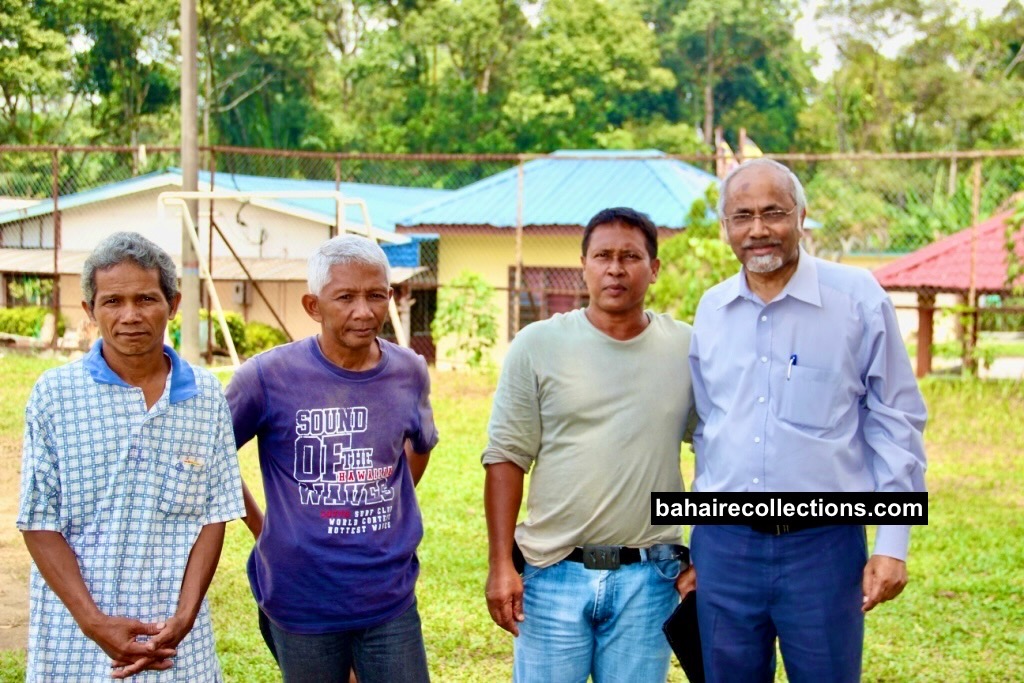
Visit to the aboriginal community in Kampong Chang in Perak in 2013. Dr. Singaraveloo stands at the extreme right, with Penghulu Shahin anak Deraoh, brother of Counsellor Marjini.
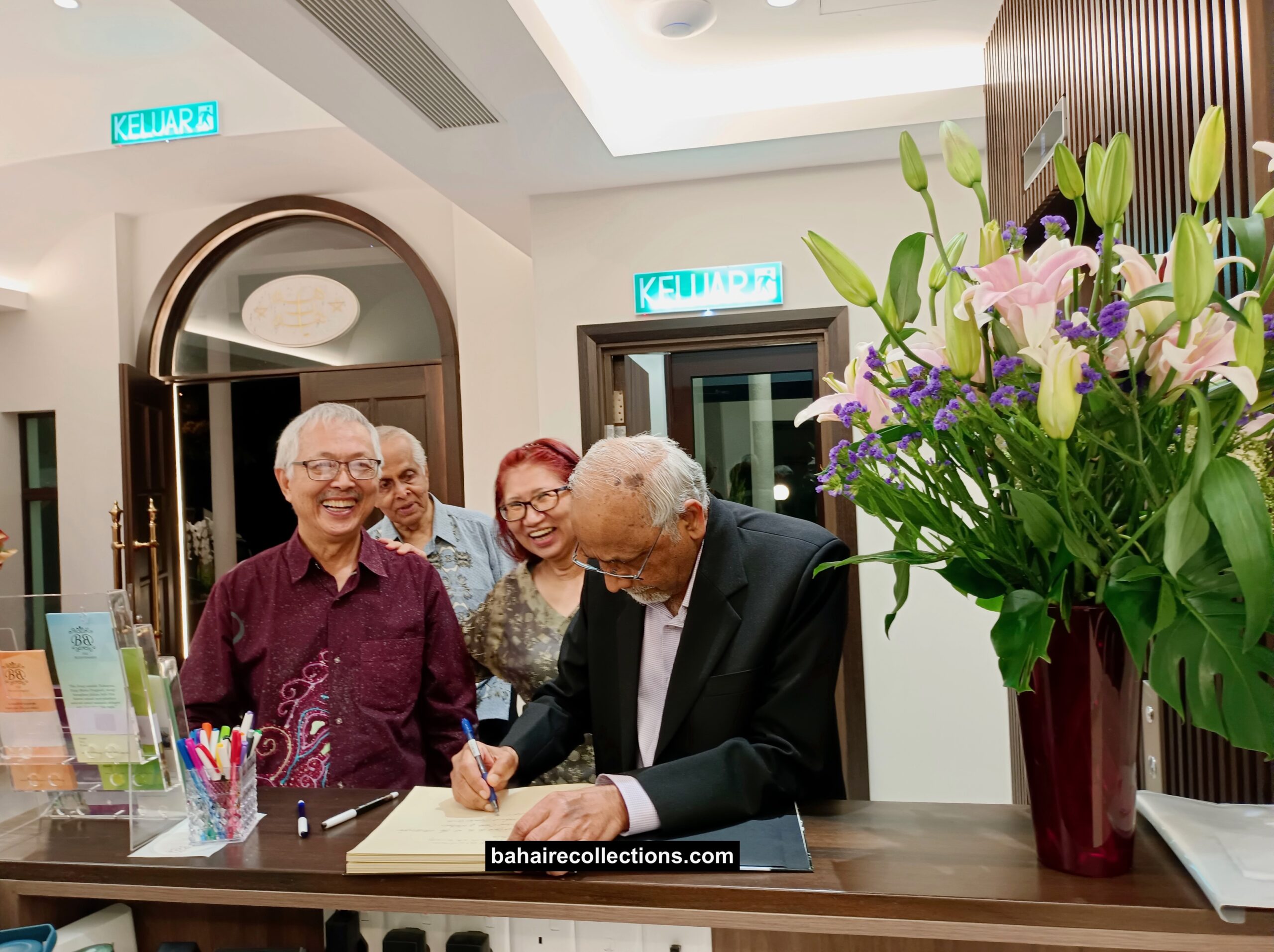
Dr. Singaraveloo signing in the visitors’ book at the official opening of the new National Haziratu’l-Quds on 2023. With him are believers who had served along with him on the national institution. To Veloo’s right is Lee Tiew Kiang (T. K. Lee). At the back are Dr. Gopinath at left and Miss Ong Eng Eng at right.
UNTIMELY PASSING
His eventful life came to an abrupt end when he was taken ill and was kept in the KPJ Johor Specialist Hospital for some seven months. As soon as news of his ailment reached the ears of the Malaysian public, they all prayed for his quick recovery. In a way, his passing was quite expected. Sorely, he passed away on 27 January 2024. While we loved him, his Creator seems to have loved him more than us and was called to His Kingdom on High. When news came of his passing, the Malaysian public could not come to terms with that. As a mark of respect for his contributions to the KPJ Johor Specialist Hospital, the hospital posted this message on its website:
KPJ Johor team would like to take this opportunity to express our immense gratitude and appreciation to our beloved Dato’ Dr. M Singaraveloo, Consultant in Internal Medicine at the close of his 21 years of service. His unwavering support for the hospital and tireless dedication for his patients will always serve as a guiding light for all of us at KPJ Johor Specialist Hospital.
Messages started to pour in, and thousands from across Malaysia rushed forth to pay their last respects. The entire length of the entrance to his house could not contain the heap of wreaths that numerous individuals and organizations had sent. No other Bahá’í funeral had seen such a heap of flowers, a sign of the hearts he had won in his lifetime.
IN DEATH TOO HE PROCLAIMED THE FAITH
In his death too Veloo gave the biggest proclamation for the Faith. On his passing KPJ Johor Specialist Hospital posted this message on its website, “We give thanks for his many years of compassionate service to all who sought his care.”
On 28 January 2024, Her Majesty Raja Zarith Sofiah Almarhum Sultan Idris Shah, the Queen of Johor State (now the Queen of Malaysia) arrived at the home of Veloo at Taman Iskandar to pay her last respects to the one who was the former family physician of the Royal families of the state of Johor. The Queen’s visit was published widely in BERNAMA, the national news agency of Malaysia. The Queen’s visit with her photograph were also published in the popular Berita Harian online edition.
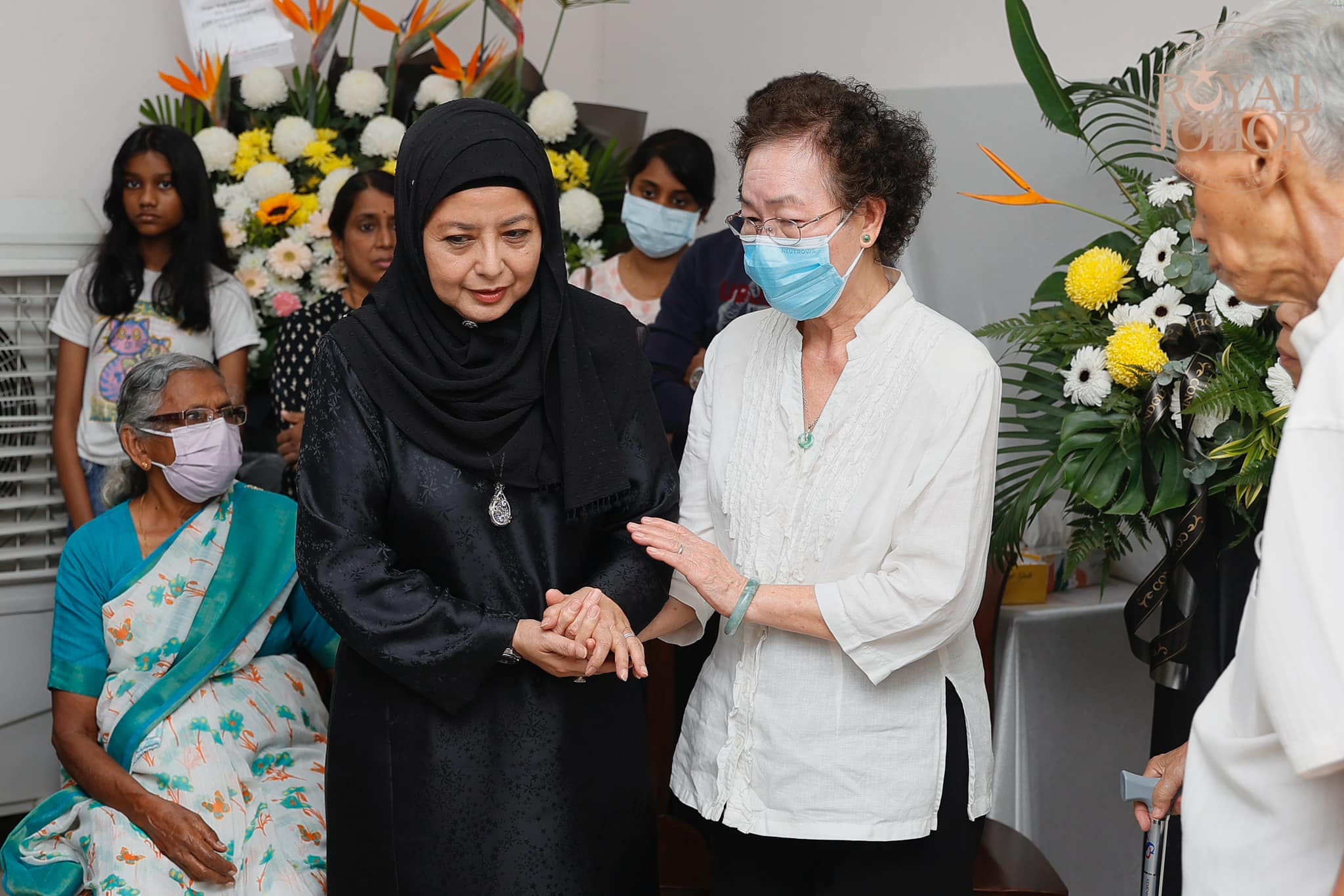
Her Majesty Raja Zarith Sofiah Almarhum Sultan Idris Shah, the Queen of Johor State (now the Queen of Malaysia) offering condolences to Ng Kan Hoe, the widowed wife of Veloo. (PHOTO COURTESY: BERITA HARIAN)
As never before, a large number of believers and numerous organizations took to Facebook to post their condolences, with very moving words.
Following a befitting funeral service held at his home, Veloo was laid to rest at the Sungei Choh Bahá’í Cemetery, witnessed by hundreds of mourners. A lorry that was hired to transport the wreaths from Veloo’s residence to the burial site could not contain all. A heap of flower hill was created at the burial site where the wreaths were placed. As a short eulogy was read at the burial site, all those who had gathered wept, with some sobbing uncontrollably. As the coffin containing the mortal remains of Veloo was lowered into the grave, all hearts sank. It was a very moving moment for all. It was a rare kind of Bahá’í funeral, as never witnessed before in this part of the country.
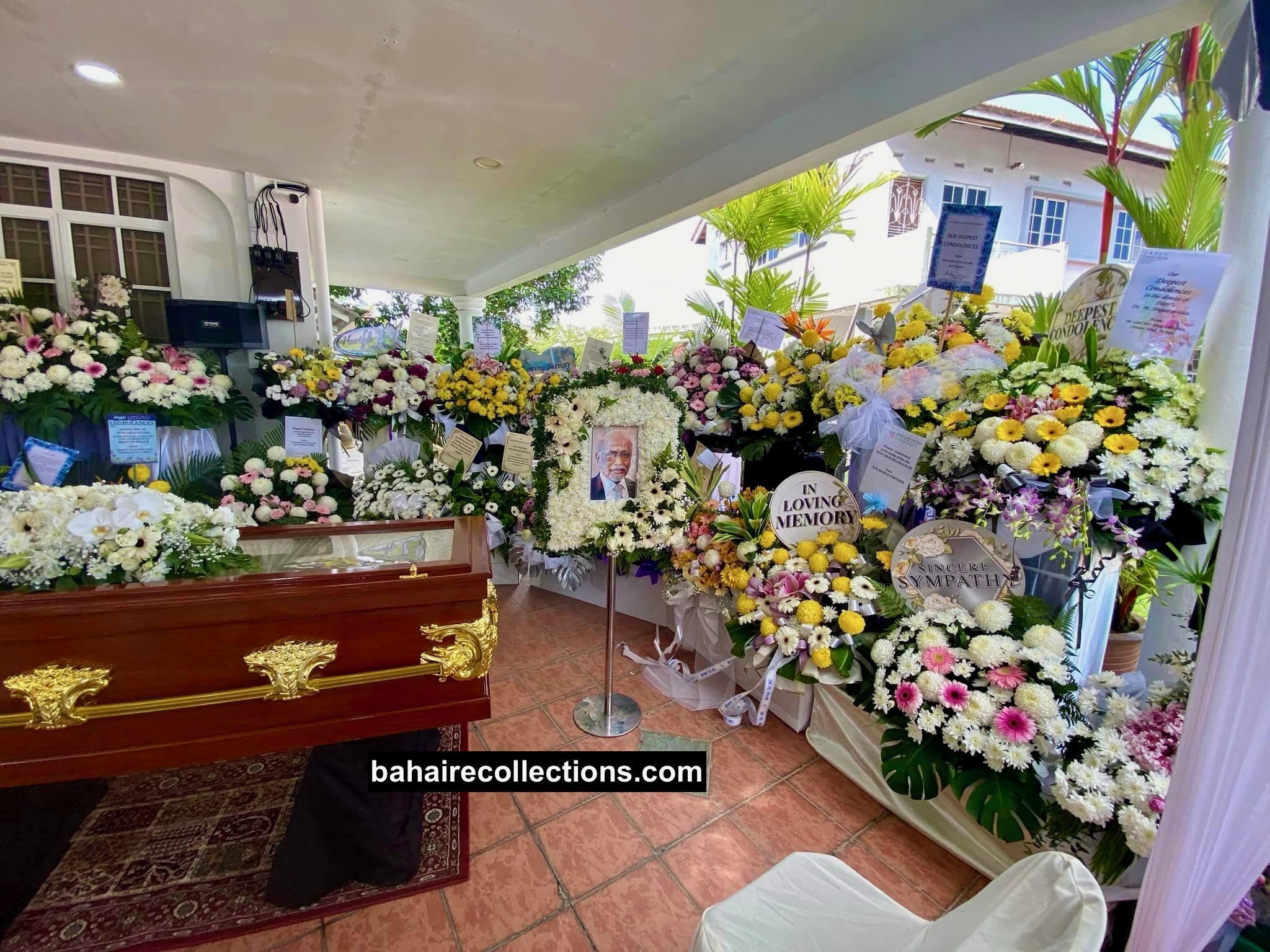
Home of Veloo, flooded with wreaths.
A RARE KIND OF BELIEVER
How Veloo was able to devote his time and energy equally between the family, the Faith and community services remains something to wonder at. Veloo was seen as a great motivator and guide for the younger generations and inspired many young ones to come up in life. At all gatherings, he found time to meet every one of them to exchange greetings, enquire about their welfare and give medical advice, if needed. He led a thrifty life in such a way that he was an example to the rich and a consolation to the poor. Having been in the Cause since December 1964, and served on the national institution till 2016, he not only knew all the active believers in the country by name but had won the immense love and admiration of one and all. During his Bahá’í life, there is no Bahá’í community Veloo had not visited, and there is no believer or non-believer whose heart he had not touched. Everyone who crosses his path always has something lovely to narrate about him. He was equally known and loved by the wider world for the spotless life that he led. He was always inflexibly opposed to name, fame, and prominence. Manifestly, his heart was attached to Baháʼu’lláh, never to the kingdom of names! Those who had moved with Veloo would agree that he loathed pride and vainglory.
Taking cognizance of the vast popularity of Veloo from the grassroots level right to the upper brackets the powers that offered him high level positions in the political realms, with good perks thrown in. But he politely and respectfully declined on grounds of the Bahá’í teachings of non-involvement in politics.
It would be appropriate to quote what Dr. Kanwal Singh, Veloo’s longtime colleague from the Muar days mentioned of him to the author, “The word ‘No’ was not in his dictionary. He would never decline any help sought by anyone. That he was at ease with the Sultans of Johor state or the Kings of Malaysia as he was with his driver is something Veloo alone could do. Veloo had done more than what a few individuals could have achieved in their lifetime. With Veloo as my friend I found it not necessary to learn about the Bahá’í Faith from books. I developed a lot of respect for the Bahá’í Faith not by reading from the books, but by the life that Veloo lived and the example he had set.”
Veloo has come a long way in the Faith, creating impactful services and leaving behind admirable traces and legacies, quite unparalleled in many ways. In looking back at the life of Veloo, it is evident and firmly established that he was a precious gift bestowed upon the community for some rare areas of service which he had carried out. His precious soul that has winged its flight to be with his Creator, is sure to be richly rewarded with divine benedictions for having faithfully, sincerely, tirelessly, and steadfastly served the Cause. We bid farewell to one who shall forever live in the innermost corners of our hearts, and certainly occupy a special and permanent place in the pages of our history.
A. Manisegaran
29 February 2024
Copyright©bahairecollections.com
You may leave your comments at:
info@bahairecollections.com